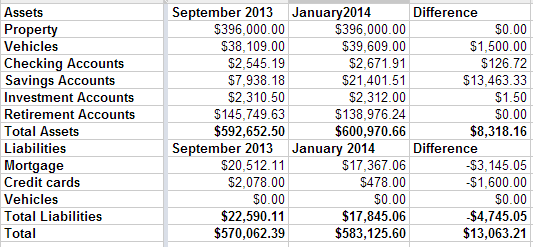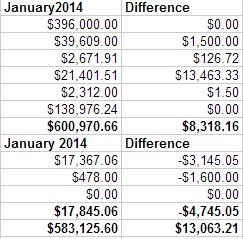- RT @kristinbrianne: Get Talk and Txt Unlimited Cell Svc w/ Free Phone for $10 per month by joining DNA for Free. http://tinyurl.com/yyg5ohn #
- RT: @ChristianPF is giving away an iPod Touch! – RT to enter to win… http://su.pr/2LS3p5 #
- 74 inch armspan and forearms bigger than my biceps. No, I don't button my shirt cuffs. #
- RT @deliverawaydebt Money Hackers Network Carnival #111 – Don't Hassel the Hoff Edition http://bit.ly/9BIAvE #
- @bargainr What would it take to get you to include me in the personal-finance-bloggers list? #
- Working on a Penfed application to transform my worst interest rate into my best. #
- Gave the 1 year old pop rocks for the first time. Big smiles. #
- @Netflix @Wii disc works well and loads fast. Go, go gadget movie! #
Anchor Price Your Salary
- Image by Dalboz17 via Flickr
Conventional wisdom says that, when negotiating your salary or a raise, you should make whatever crazy ninja maneuvers it takes to get the other person to name a number first.
Horse pellets.
Have you ever watched an infomercial? Those masters of of impulse marketing geared towards insomniacs, invalids, and inebriates?
“How much would you pay for this fabulous meat tenderizer/eyelash waxer? $399? $299? No! If you call within the next 73 seconds, we will let you take this home for the low, low price of just $99.99!”
That’s the magic of anchor pricing.
The first number you hear is the number you will base all further numbers on. If you hear a high number, other lower numbers will feel much lower by comparison. The number doesn’t even have to be about money.
There was a study done that had the subjects compare a price to the last two digits of their social security numbers. Those with higher digits found higher prices to be acceptable, while those with lower prices only accepted cheaper prices.
What does an infomercial marketing ploy have to do with your salary?
If you are negotiating your salary and your potential employer gives a lowball offer, every higher counteroffer after that will much, much higher than than it would otherwise. On the other hand, if you start with your “perfect” salary, they amount you will be happy to settle for won’t seem to be nearly as high to the employer. At the same time, you will be less likely to accept a lowball offer if you set your anchor price high.
For example, if you are looking to make $50,000:
The employer offers you $40,000. $60,000 seems too high by comparison, so you counter with $50,000, then compromise and settler for $45,000. Or, you could start at $60,000, making the employer feel that $40,000 is too low, so he counters with $45,000, leaving a compromise at $52,000. That’s a hypothetical $7,000 boost, just for bucking conventional wisdom and taking a cue from the marketing industry.
How have you negotiated your salary?
What do you do?
You’re not your job. You’re not how much money you have in the bank. You’re not the car you drive. You’re not the contents of your wallet. You’re not your ******* khakis. -Tyler Durden
“What do you do?”
They typical answer is usually something like “I’m a computer programmer.” Or a DJ, a cop, a barista, a stripper, or whatever.
The answer is always given in the context of work. Is work the center of your life? Is your career the most important thing you have? For many, it is. Our jobs become a fully integrated piece of our identities. Even when we pay lip-service to putting our families first, all too often, we spend more of our waking hours working than actually living.
We spend 40, 50, 60 hours each week at our jobs. It’s natural for that to become a part of us.
We go too far.
I am not my job. I am not my career.
I am a father, a husband, a writer, a blogger, and more. I have hopes, dreams, and ambitions entirely apart from my career.
I hope you do, too.
The next time someone asks you what you do, try responding with your passion.
“I’m a parent.”
“I grow freaking awesome roses.”
“I travel whenever I can.”
“I obsess over politics.”
Leave the tradition work-centric script behind. You’re going to confuse the people who are expecting it. They think they are asking about your job and you are responding with something that truly matters to you.
What do you do?
Year of the Unfair Fees
The year 2011 was a challenging economic year for many, with housing prices continuing to fall in many parts of the country, with unemployment numbers remaining high and with a credit crunch making it challenging for many to get new cards or unsecured loans.
Those going through economic turmoil were, unfortunately, faced with little understanding from many corporate conglomerates. In fact, so many companies instituted so many silly fees and surcharges that 2011 may as well be known as the year of unfair fees.
Whether you are taking out unsecured loans, opening a bank account or signing a TV service contract, it is up to you to read the contract carefully and be mindful of the fees you are being assessed.
Debit Card Use Fees
Many people who are trying to get out of debt and pay off credit cards, unsecured loans and other obligations may consider making a commitment to avoiding credit and using their debit card instead. Unfortunately, in 2011, many banks wanted to try to make this more expensive for consumers who were trying to be financially responsible.
Faced with a limit on the fees they could charge for debit transactions, a number of banks began to explore the idea of a monthly charge to consumers of between $4 and $5 just for using their debt card. Politicians and the public reacted so strongly against this, however, that the banks relented and gave up the plan. [ed. Just like Suze Orman’s new blunder!]
Fees for Depositing Cash
Also near the top of the list are the fees that certain banks institute to business customers who deposit large sums of money. Some banks will charge a small fee if you deposit in excess of a certain amount, depending upon the type for account you have. For instance, one major bank charges .20 for each $100 in cash deposited over $10,000. The fees are small, but some customers are still upset at the principle. After all, just what is that fee justified by since all you are going is giving the bank your cash to put into your account.
Airline Fees
Airline fees aren’t a new thing and almost everyone is now aware that they’ll be charged for bags on many flights. However, in 2011, some airlines decided to try to take things a step further. Passengers faced fees for booking a ticket, for printing a boarding pass at the counter instead of at home and even for taking a carry-on bag. These surprise fees that hit you may make it difficult to comparison shop for the best flights, making it harder for cash-strapped consumers to find affordable travel.
Early Termination Fees
Early termination fees have become standard for cell phone contracts, but the dreaded charges are now spreading to other industries as well. Some television service providers have now instituted early termination fees for consumers who end their contracts with the service providers early. The cable and satellite companies attempt to justify this by saying they need to cover the prices of the expensive equipment used to provide you with service, but the companies have come under fire anyway. In fact, one major satellite company recently had to settle with regulators over its business practices and cancellation policy.
Watching for Fees
Only by being diligent will you avoid the excessive fees that banks and other companies are beginning to institute in a time when every cent counts.
Post by MoneySupermarket.
Late Pass: Insurance for the Terminally Ill?

This is a guest post.
Uh oh. Not only have you put in decades of loyal service for a company that does not offer a life insurance policy to employees, now you have a terminal disease that has numbered your days. You always meant to get a life insurance policy at some point, but it was just one of those things that there was never enough money left for at the end of a month after bills, groceries and just enough fun to make worthwhile.
Your life is one that needs insuring to protect your family following the now-inevitable, but has that ship sailed? Is it possible to make up for lost time by obtaining a life insurance policy as a terminally ill patient?
You already know that insurance companies are experts at assessing risk. Each potential policy holder is effectively examined to determine their likelihood of living a reasonably long time, and a terminal illness is an obvious negative in this department.
Many insurance companies will be hesitant to offer a comprehensive policy that they know they will have to pay out in fairly short order, but you may be able to get a type of life insurance known as graded premium life insurance.
With graded premium life insurance, you pay a monthly premium to retain coverage. If your illness should terminate within two years, your family will receive all the premiums you have paid as a benefit. Should you last longer, the insurance provider pays the full value of the policy. This is a compromise that gives you the peace of mind that a life insurance policy can provide while allowing the insurance provider to minimize their risk.
These policies typically have cash values ranging from $10,000 to $50,000, so while they might not guarantee the permanent stability of your family, it will offer them much-needed assistance through what is sure to be a difficult time in their lives. Premium amounts vary by age and relative health, but generally the closer you are to qualifying for a payout, the more it costs to enter the lottery.
Life is unpredictable except for its certain end, and sometimes this reality leaves us less prepared for the future as we would like. Fortunately, a terminal illness does not make a person completely uninsurable in most cases. Of course, it is much easier and less expensive to get life insurance as a person who is not dying, so the best strategy may be to invest before your health becomes an issue.
Net Worth Update – January 2014
This may be the most boring type of post I write, but it’s important to me to track my net worth so I can see my progress. We are sliding smoothly from debt payoff mode to wealth building mode.
Our highlights right now are nothing to speak of. We did let our credit card grow a little bit over the last couple of months, but paid it off completely at the end of December. It grew mostly as a matter of not paying attention while we were doing our holiday shopping and dealing with some car repairs.
That’s it. We haven’t remodeled our bathrooms yet, but we have the money sitting in a savings account, waiting for the contractor. We haven’t bought a pony yet, but we did decide that a hobby farm wouldn’t be the right move for us. We’ll be boarding the pony instead of moving, at least for the foreseeable future.
Our net worth is up $13,000 since September. Our savings are up and our retirement accounts are down because there are two inherited IRAs that we need to slowly cash out and convert to regular IRAs.






